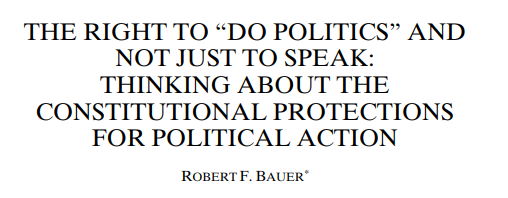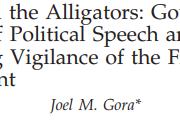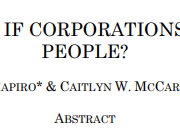In this Duke Journal of Constitutional Law and Public Policy article by former White House Counsel to Barack Obama, Robert F. Bauer, the author examines the Supreme Court’s distinction between political contributions and campaign expenditures and its impact on campaign finance jurisprudence.
In Buckley v. Valeo, the Court upheld the Federal Election Campaign Act’s limits on political contributions to candidates for federal office and struck down various provisions that had limited campaign expenditures made by candidates, campaigns, and individuals. Under Buckley, Congress has more leeway to limit campaign contributions and less leeway to regulate expenditures – particularly where the expenditures are independent of candidate control or influence. This framework has withstood the critiques directed against it for many years. However, four of the current Justices of the Supreme Court have declared their readiness to reconsider the distinction between contributions and expenditures, yet the criticisms of Buckley continue to be conducted within the very terms it set. The arguments remain primarily about adjustments in the balance to be struck between government regulatory interests and First Amendment speech protections. Proponents of deregulated politics propose to protect more speech by granting greater First Amendment protections to contributions. Supporters of more active regulation of campaign spending come at the problem the other way, disputing the privileged speech value of the independent expenditure.
In Bauer’s view, there is more, however, to the deficiencies of Buckley. The decision did not capture the range of First Amendment interests at stake; “speech” does not exhaust that range. Neither does its cousin – expressive association. The missing dimension of the First Amendment analysis is the interest in political action: the business of building coalitions and acting in concert with allies and others to achieve common political goals. This interest – Bauer terms it “doing politics” – is irreducible to speech interests alone.
As Bauer argues, the constitutional lens through which the Buckley debate has been conducted leaves insufficient space for this critical interest in “doing politics.” Restoring the interest in “doing politics” to the discussion would contribute to understanding the unsatisfactory, inconsistent, and confused applications of the current doctrine, and would bring to light the costs exacted by the current doctrine’s singular focus on speech interests as a concern separated from the larger sphere of political action.














